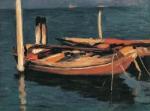Oeuvre exhibition of József Koszta
Tornyai János Museum and Community Center

The art of József Koszta (1861-1949), one of the most individual of 20th-century Hungarian painters, has received regrettably little attention in recent decades. Apart from smaller displays, his last retrospective exhibit was at the National Salon in 1948, the year before his death, after he was among the first to receive the Kossuth Prize for an outstanding oeuvre.
From the start, his fervent paintings were considered characteristically Hungarian wherever they were shown in the world: colour-rich and densely meaningful, yet succinct concentrations of the complex and contrasting character of this land and its people. Plucky and self-confident, he was born into a poor family in Transylvania. While attending all major schools and visiting all countries of interest to learn the ins and outs of the art, he was in constant search for the ideal milieu, which he eventually found among the small farms of the Great Plains, in and around Szentes. The artist communities of Nagybánya and Szolnok could hold his interest for only a short time; his thirst for freedom and stubborn resistance to being associated with others were legendary. With an evocatively dramatic and characteristically coarse, down-to-earth style, he became a self-willed heir of Munkácsy’s ideals, while his work was also abreast of the achievements of his European contemporaries. His intensive colours make him a kin of the Fauves, while the almost completely original imagery of his late period is responsible for a stunningly modern effect. This latter, lesser known part of József Koszta’s exemplary oeuvre will also be highlighted at our exhibition, which selects from public and private collections to provide the most comprehensive overview to date.
A new monograph on Koszta by Anna Szinyei Merse, the exhibition’s chief curator, will also add new details to the currently held general view of the artist, and will offer documentary evidence that will clarify certain details.
János Tornyai Museum
6800 Hódmezővásárhely, Dr. Rapcsák András út 16-18.
